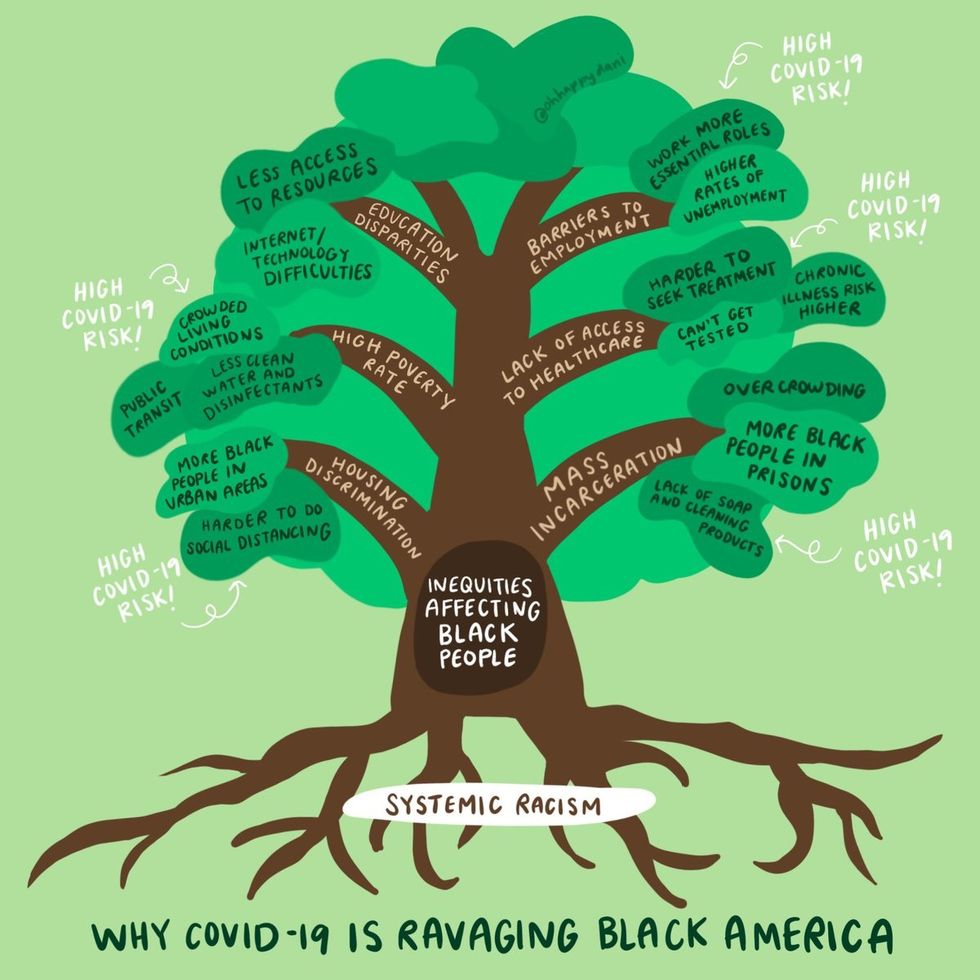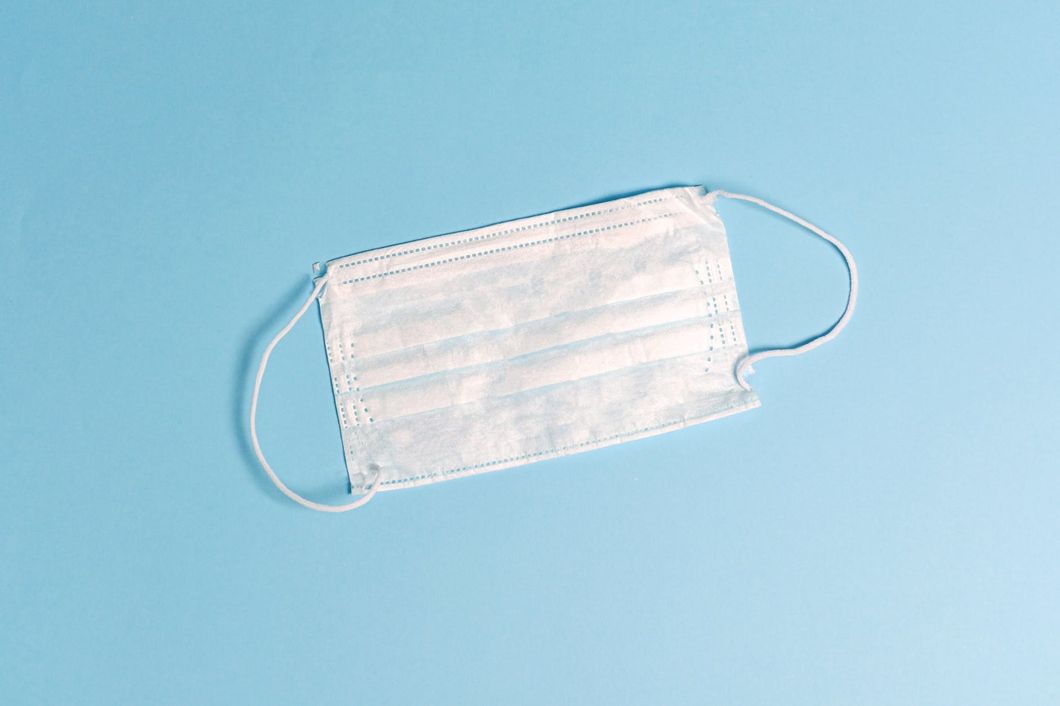The United States officially has the most Coronavirus cases in the world. While this may be the last thing we would want to be ranked #1 in, this is the stark reality of this pandemic. One factor that is not being talked about as much, is how COVID-19 is affecting different communities at such drastically different rates.
Black Americans are dying at disproportionate rates from COVID-19; while they make up 13.4% of the population in the United States, they are accounting for high rates of deaths of COVID-19. While not all areas in the U.S. have disclosed the demographic make-up of the people who have contracted and died from COVID-19, there is data available which proves this phenomenon.
- In Louisiana, 70% of COVID-19 deaths were Black people, even though they make up about 33% of the state's population.
- In Michigan, 40% of COVID-19 deaths were Black people, even though they make up for 14% of the state's population.
- In Illinois, 43% of the COVID-19 deaths were Black people, even though they make up for 15% of the state's population.
It is time to break down some of the factors which lead to these statistics. At the root of all of the inequities affecting Black people, systemic racism is the biggest factor. These systems of oppression and inequality stem from generations of trauma induced by racism and white supremacy.
Social Factors:
1. Education Disparities
These educational disparities include things like access to adequate resources that provide information about the spread of the virus and ways to prevent the spread. Additionally, these barriers can translate over to internet and technology access (and lack thereof). This is critical, given that so much of the information about the Coronavirus is being reported on through visual media and online avenues, making it difficult for those who do not have reliable internet access to get up-to-date information.
2. Healthcare Disparities
Increased health risks such as hypertension, diabetes, and high blood pressure are all chronic illnesses that qualify as high risk for COVID-19, which are common for Black Americans Even before the pandemic, many Black Americans did not seek medical treatment, for fear of not being believed or taken seriously, or due to the lack of resources to get health insurance or pay for medical care. This financial burden also has an effect during the pandemic, especially in terms of seeking tests and other preventative medical treatments.
Political Factors:
3. Mass Incarceration
The well-known reality is that there are more black people in prison, with about 37.6% of the prison population consisting of Black people, again, while they only represent 13.4% of our population. Another issue here is the overcrowding within the prisons themselves, which makes these venues highly susceptible to the quick spread of the Coronavirus. Lastly, there is a lack of sanitary products available to those who are incarcerated, which is extremely problematic when we are told to constantly be washing our hands to avoid the spread.
4. Housing Discrimination
Redlining and gentrification have led to Black communities living in urban areas that cluster the community in these high traffic areas making it harder to social distance. These policies in conjunction with employment barriers have also led Black Americans to be less likely to own their own home which increases the possibility of crowded living conditions.
Economic Factors:
5. The Workforce & Employment Barriers
Black people are more likely to work in jobs that are deemed as essential, thus eliminating the luxury from working at home, with increased interactions with others. It has been reported that only around 19% of Black Americans have occupations where they can work from home. Some of the industries they are working in include transportation and warehouse jobs. Black Americans also suffer from higher rates of unemployment, which leads directly to the next point.
6. High Poverty Rates
Black people are less likely to own a car which leads to them taking public transportation with, again, increased interactions with others. Typically related to this issue of poverty is the lack of access to clean water and supplies like masks, disinfectants/ cleaning supplies, and even soap; these are things that have been deemed critical to help stop the spread of the virus.
All of these factors are combined to create this catastrophe for Black communities across the country, but do not mistake, these factors and issues are all interconnected. Generational trauma from racism leads to these health risks. Racism leads to both implicit and explicit discrimination in the job force, oftentimes leading to Black Americans working jobs which ultimately produce less income, resulting in poverty as a whole. Poverty leads to fewer resources to purchase health insurance and sanitary supplies..etc. The cyclical nature of oppression is one that aims to keep certain communities at the bottom of society's hierarchy.
This pandemic does not discriminate based on race; it is the systems and institutions in place that plague our nation to be predisposed to such racial tendencies. We do not live in a post-racial world, and most definitely not a post-racial country- this pandemic is proof of that.
Inspiration for how I organized this article came from art by "ohhappydani" on Instagram. You can view her graphic here:






 Going to the cinema alone is good for your mental health, says science
Going to the cinema alone is good for your mental health, says science












 women in street dancing
Photo by
women in street dancing
Photo by  man and woman standing in front of louver door
Photo by
man and woman standing in front of louver door
Photo by  man in black t-shirt holding coca cola bottle
Photo by
man in black t-shirt holding coca cola bottle
Photo by  red and white coca cola signage
Photo by
red and white coca cola signage
Photo by  man holding luggage photo
Photo by
man holding luggage photo
Photo by  topless boy in blue denim jeans riding red bicycle during daytime
Photo by
topless boy in blue denim jeans riding red bicycle during daytime
Photo by  trust spelled with wooden letter blocks on a table
Photo by
trust spelled with wooden letter blocks on a table
Photo by  Everyone is Welcome signage
Photo by
Everyone is Welcome signage
Photo by  man with cap and background with red and pink wall l
Photo by
man with cap and background with red and pink wall l
Photo by  difficult roads lead to beautiful destinations desk decor
Photo by
difficult roads lead to beautiful destinations desk decor
Photo by  photography of woman pointing her finger near an man
Photo by
photography of woman pointing her finger near an man
Photo by  closeup photography of woman smiling
Photo by
closeup photography of woman smiling
Photo by  a man doing a trick on a skateboard
Photo by
a man doing a trick on a skateboard
Photo by  two men
two men  running man on bridge
Photo by
running man on bridge
Photo by  orange white and black bag
Photo by
orange white and black bag
Photo by  girl sitting on gray rocks
Photo by
girl sitting on gray rocks
Photo by  assorted-color painted wall with painting materials
Photo by
assorted-color painted wall with painting materials
Photo by  three women sitting on brown wooden bench
Photo by
three women sitting on brown wooden bench
Photo by 
 Photo by
Photo by  Photo by
Photo by  Photo by
Photo by  Photo by
Photo by 


 people sitting on chair in front of computer
people sitting on chair in front of computer











